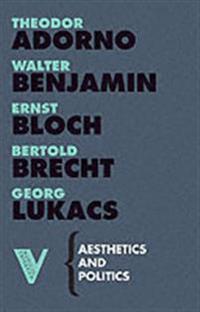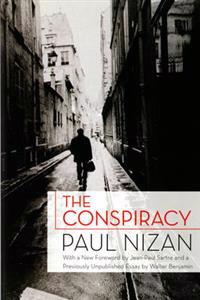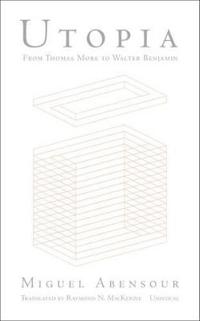The Origin of German Tragic Drama (Häftad)
avWalter Benjamin
ISBN: 9781844673483 - UTGIVEN: 2009-05Cited by Lukacs as a principal source of literary modernism, Walter Benjamin's study of the baroque stage-form called Trauerspiel (literally, "mourning play") is the most complete document of his prismatic literary and philosophical practice. Engaging with sixteenth- and seventeenth-century German p[...]
Walter Benjamin (Häftad)
avTerry Eagleton
ISBN: 9781844673506 - UTGIVEN: 200905Eagleton is second to none among cultural critics writing in the English language today. --Guardian
Aesthetics and Politics (Häftad)
avTheodor W. Adorno, Walter Benjamin, Ernst Bloch
ISBN: 9781844675708 - UTGIVEN: 200612No other country and no other period has produced a tradition of major aesthetic debate to compare with that which unfolded in German culture from the 1930s to the 1950s. In Aesthetics and Politics the key texts of the great Marxist controversies over literature and art during these years are assemb[...]
The Conspiracy (Häftad)
avPaul Nizan, Jean-Paul Sartre, Walter Benjamin
ISBN: 9781844677689 - UTGIVEN: 201111The Conspiracy, winner of the Prix Interallie in 1938, was Paul Nizan's last novel and was hailed by Jean-Paul Sartre as his masterpiece. It is centered upon the figure of Bertrand Rosenthal, philosophy student at the Ecole Normale, would-be revolutionary and scion of a haut-bourgeois Jewish family.[...]
Introducing Walter Benjamin (Pocket)
avHoward Caygill, Howard Caygill, Alex Coles, Alex Coles, Andrzej Klimowski, Andrzej Klimowski
ISBN: 9781848316928 - UTGIVEN: 2014-10Walter Benjamin is often considered the key modern philosopher and critic of modern art. Tracing his influence on modern aesthetics and cultural history, Introducing Walter Benjamin highlights his commitment to political transformation of the arts as a means to bring about social change. Benjamin wi[...]
Walter Benjamin (Häftad)
avEsther Leslie
ISBN: 9781861893437 - UTGIVEN: 2007-11Walter Benjamin, critic, essayist, translator, philosopher one of the twentieth century's most influential intellectuals continues to intrigue today. His work stimulates a profusion of responses in the form of new novels, operas, films and artworks, as well as a never-abating production of academic [...]
Walter Benjamin - Berlin Childhood Circa 1900 (häftad)
ISBN: 9781935662136 - UTGIVEN: 2015-10This fresh translation by Carl Skoggard of philosopher Walter Benjamin's (1892-1940) engaging memoir remains faithful to the author's voice. Readers are offered glimpses of an anonymous Berlin childhood which might have been Benjamin's own, with recollections of an affluent Jewish home in Berlin's W[...]
Utopia from Thomas More to Walter Benjamin
ISBN: 9781945414008 - UTGIVEN: 2017-01\u201cUtopia poses a question. Not simply in the sense of a problem to be resolved and at the same time eliminated . . . but in the sense that, within the economy of the human condition, utopia, the aim of social alterity-of all social otherness-is ceaselessly being reborn, coming back to life despi[...]
Nietzsche?s Nihilism in Walter Benjamin
ISBN: 9783319392660 - UTGIVEN: 2016-12This book reconstructs the lines of nihilism that Walter Benjamin took from Friedrich Nietzsche that define both his theory of art and the avant-garde, and his approach to political action. It retraces the eccentric route of Benjamin's philosophical discourse in the representation of the modern as a[...]
Walter Benjamin (Pocket)
avBernd Witte
ISBN: 9783499503412 - UTGIVEN: 1985-01Anders als viele Literaten, die erst nach langem Anlauf den eigenen Ton finden, ist Walter Benjamin in seinen Schriften von Anfang an ganz er selbst. In den Jahren unmittelbar vor dem Ersten Weltkrieg, in denen er sein Studium begann, fanden der Protest gegen bürgerliche Lebensformen und die Ahnung[...]
Das Kunstwerk im Zeitalter seiner technischen Reproduzierbarkeit (Inbunden)
avWalter Benjamin
ISBN: 9783518068526 - UTGIVEN: 2006-09Ursprung des deutschen Trauerspiels (Pocket)
avWalter Benjamin
ISBN: 9783518278253 - UTGIVEN: 200704Gesammelte Schriften I. Abhandlungen (Pocket)
avWalter Benjamin
ISBN: 9783518285312 - UTGIVEN: 2006-03Gesammelte Schriften II. Aufsätze, Essays, Vorträge (Pocket)
avWalter Benjamin
ISBN: 9783518285329 - UTGIVEN: 2006-03Gesammelte Schriften V. Das Passagen-Werk (Pocket)
avWalter Benjamin
ISBN: 9783518285350 - UTGIVEN: 2011-10Berliner Kindheit um neunzehnhundert (Pocket)
avWalter Benjamin
ISBN: 9783518461976 - UTGIVEN: 201108Werke und Nachlaß. Kritische Gesamtausgabe 3 (Inbunden)
avWalter Benjamin
ISBN: 9783518585016 - UTGIVEN: 2008-05Walter Benjamins Dissertation - 1918/1919 in Bern entstanden und 1920 in einem Berner Verlag gedruckt - ist seine erste Buchveröffentlichung, in der bereits viele Motive seines späteren Denkens angelegt sind. Benjamin selbst schrieb über seine Arbeit: "Was sie sein sollte, ist sie geworden: e[...]
Werke und Nachlaß. Kritische Gesamtausgabe 8 (Inbunden)
avWalter Benjamin
ISBN: 9783518585245 - UTGIVEN: 2009-12?Die Konstruktion des Lebens liegt im Augenblick weit mehr in der Gewalt von Fakten als von Überzeugungen. Und zwar von solchen Fakten, wie sie zur Grundlage von Überzeugungen fast nie noch und nirgends geworden sind. Unter diesen Umständen kann wahre literarische Aktivität nicht beanspruchen, i[...]

























